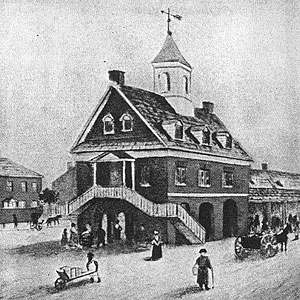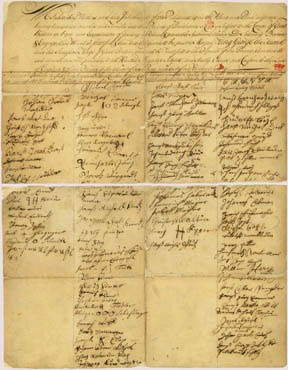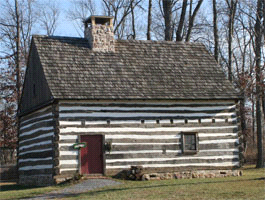

Chickasaw Tribal Nation
c/o Vogel Denise Newsome - Prime Minister
Utica International Embassy
Post Office Box 31265
Jackson, Mississippi 39286
Phone: (888) 700-5056 or (601) 885-3324
Email: email@uticainternationalembassy.website


Chickasaw Tribal Nation
c/o Vogel Denise Newsome - Prime Minister
Utica International Embassy
Post Office Box 31265
Jackson, Mississippi 39286
Phone: (888) 700-5056 or (601) 885-3324
Email: email@uticainternationalembassy.website
As of 07/15/2021 Cut and Pasted From: http://lynnheidelberg.org/beginnewlife.html
17 USC § 107 Limitations on Exclusive Rights – FAIR USE
The Beginning of a New Life
By: Virgina Woodward

Once embarking the ships, the first stop for the German immigrants was to the Philadelphia Court House.
In the early 1700's the Germans were immigrating to America in large numbers. Pennsylvania was an English speaking colony and the Provincial Council of Pennsylvania was alarmed at the large numbers of Germans entering the province; they felt like they were being overrun by the Germans. In a one month time span five ships had arrived in Philadelphia each carrying over 300 German immigrants. Even Benjamin Franklinwas getting a little nervous at all the German speaking people living in Pennsylvania.
They knew nothing about the laws and the language of the English. Would the official language of Pennsylvania become German? That was a thought Benjamin Franklin could not abide. In 1727 the Provincial Council approved an oaththat all male Germans over the age of 16 years of age were required to sign when they arrived in America. The oath was an attempt by the Provincial Council to assure itself that the foreigners would agree to abide by the rules and regulations of the English government. The oath-takers disavowed any ties to other monarchs and pledged an oath of allegiance to England.
The captains of all ships carrying German immigrants prepared a list of all male German passengers over the age of 16. When the ship docked in Philadelphia, all passengers on the list boarded a small boat and were transported to land and the captain led these men to the proper authorities. The women and children remained on the ship.
The captain and the men walked from the ship onto Front Street amid the hustle and bustle of the warehouses. It must have been a shocking scene for the men from the quiet villages of Germany. They turned down to Second Street and on to the Court House topped with its cupola and weathervane. They marched up the front steps and through the portico to wait for the governing men in the curly white wigs to administer the oath. Clerks read the oath to the new immigrants in English so they probably understood none of it. It is possible that they had a translator to explain the oath to them. After the clerk read a section of the oath, all the new immigrants had to repeat it. This continued for the entire oath.
The oath was the following:

Oath of Allegiance, September 1727
"We subscribers, natives and late inhabitants of the Palatinate upon the Rhine and places adjacent, having transported ourselves and families into this province of Pennsylvania, a colony subject to the crown of Great Britain, in hopes and expectation of finding a retreat and peaceable settlement therein, do solemnly promise and engage that we will be faithful and bear true allegiance to his present majesty, King George II, and his successors, kings of Great Britain, and will be faithful to the proprietors of this province, and that we will demean ourselves peaceably to all his said subjects and strictly observe and conform to laws of England and this province, to the utmost of our power."
Upon taking the oath, the passengers were required to sign their names on two pieces of paper. Since the German people could not speak English, many officials considered them not intelligent. However, when required to sign their names, many of the passengers did so in their own language signifying some amount of education. If the immigrant was unable to sign his name, a registrar wrote their name for them and they placed an "X" near their name.
These lists and signatures would later give genealogists the information they needed about when the German ancestors arrived in this country and the ship they arrived on.
After signing the oath the men were taken back to the ship. If passengers had not had enough money to pay for their trip to America, they were "hired" by merchants for a definitive period of time until the passage to America was paid for. Those passengers who had enough money to pay their bills for the voyage to America were now free to travel about the country.
When a ship carrying immigrants from Germany arrived in the port of Philadelphia, bells were ringing in the city. This was to alert the citizenry to the fact that there was a boat loaded with immigrants in the port. The citizens would come to the boat to welcome the passengers and also to find indenture servants to fill their labor needs. The German people of Philadelphia who were expecting relatives from the homeland would greet the ship with fruit and other foods. All Germans in this country at that time had experienced the trip across the ocean and were well aware of what the passengers needs were. The established citizenry was also looking for news from the homeland.
The passengers had two documents with them on this voyage. The first was a passport that all citizens of Germany and Switzerland were supposed to have. The passport stated that the community the immigrant came from did not have any dangerous plague or infectious diseases. It also stated that the immigrant has paid all the taxes necessary to allow him to travel freely. The second document was a letter of recommendation issued by the pastor of the immigrant's home church.
The German immigrants were not moving to America and adopting the ways of the English speaking community. The German immigrants moved to America and brought with them the German language and the German way of doing things. Their communities in America were simply the German culture transplanted to American soil.
When the Germans arrived in this country, some of them went to the frontier and every year the German settlers would push the frontier further west. They were looking for good land that had not already been claimed. They could tell good land by the trees that grew on it. If there were a lot of walnut trees, the land was very fertile. The fact that they would have to cut down the trees to build a new home and create land that could be farmed did not deter them. The long standing forests were coming down by the mighty blows of the immigrant's axe. Their homes were appearing wherever there was a cool spring. The first home was not grand; perhaps it was a crude hut or a tent; cutting down trees took a lot of time. However, an area that was an unbroken forest would soon become a well kept farm.

Restoration of the 1740's Zeisloff Log Cabin in Ontelaunee Park.
Germans invariably cleared the land by the "Yankee method." They cut down all the trees, grubbed out saplings and underbrush, and pulled all but the largest stumps out of the ground. There were many uses for the trees that were chopped down. They were used to make a temporary shelter or fences or to be used as firewood. The farmer needed to get crops planted so after the trees were toppled; the cleared area was burned to rid the area of the brush, saplings and small stumps. The large stumps were left in the ground to rot; a process that took about ten years. The ashes that remained from the burning were beneficial to the soil. If the ashes were properly refined, they created a saleable product called potash. However, this process took an enormous amount of human labor and in the beginning the men were very busy just keeping their families alive and well.
Life on the frontier had it hardships but the hardships led to dearly held traits. The Germans were very thrifty and self-reliant. They had a love of liberty that they cherished and were willing to fight for; they knew what it was like to be subservient. They were a close knit family and they had a deep reverence for God. The neighborhood cooperation that was born from necessity was a great social asset. Any gathering of people helping people for whatever reason became a social event.
In Germany, the farm house and the barn were located in the village. When the Germans settled in Pennsylvania, they did not form small villages. They looked for large acreage and built their home and barn on the large acreage. Thus the farmer became more of an individual and more independent. The virgin land with its rich soil yielded a very large bounty. The combination of good soil, the work ethic that the immigrants brought from Germany and their knowledge of growing crops and caring for animals allowed the immigrants to become self-sufficient and productive citizens in their new country in a very few years.